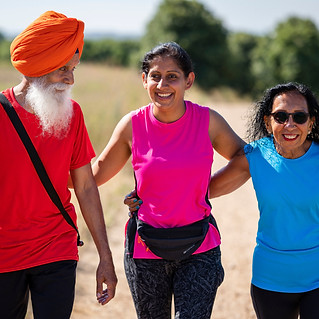
Feel good food
How eating the right foods can improve our mood
Food plays a huge part in how we feel, and research has shown that people experiencing chronic or long-term loneliness have a lower intake of protein, fruits, and vegetables in their diet. Longer-term loneliness also affects appetite, from a lack of motivation to cook and eat less to a higher consumption of unhealthy foods and alcohol. Nutritional therapist Susie Strachan explains how choosing the right foods can have a beneficial effect on our moods and our social lives.
Fats are your friends
A lot of us have been brought up to think that fats are bad and that we should be on low-fat diets, but low-fat diets tend to be higher in sugar. We need healthy fats that contain omega-3 fatty acids. These helpful fats can fuel your brain and lift your mood. We find a lot of Omega 3’s or healthy fats in avocados, olive oil, nuts and oily fish like salmon and mackerel.
Good gut health
90% of serotonin - known as the happiness hormone - is made in the gut. So the health of our guts has a direct impact on our mood. For optimal gut health, we should eat lots of fibre from fruit and vegetables and eat a rainbow of colours. The more variety, the happier your helpful gut bacteria are. All fruit and vegetables contain fibre, as do healthy whole grains and pulses like brown rice, barley, oats and chickpeas. Raspberries, apples, celery and sweet potato are examples of fruits and veg that are high in fibre, but make sure you eat the whole fruit as you don’t get the full benefit of the fibre if you take the skin off or juice it.
Terrific tryptophan
Tryptophan is an essential amino acid that has a positive effect on depression, mood and memory skills. The human body does not produce it naturally, so you need to get it through other animal or plant-based sources. Examples of tryptophan-rich foods include chicken, turkey, bananas and nuts. Also, ensure you eat protein at every meal, as it is needed to synthesise neurotransmitters such as serotonin and melatonin, which help to promote better sleep. It also helps you to stay full. Choose protein like chicken and turkey (red meat just once a week) or tofu, chickpeas or lentils.
Balance your blood sugar levels
Balanced and stable blood sugar levels equal balanced energy and mood. Sugary foods feel good at the time and give us a buzz of energy, especially if eaten alone, but an hour or so later, we can crash and feel tired, low or hungry. If you have a sweet tooth, the trick is not to eat sugary foods by themselves: if you want a piece of chocolate or a biscuit, have it after you’ve eaten something else or at the end of a meal. Try to always combine carbohydrates with protein and healthy fats. The rest of the food will buffer the impact of the sugar and make you less susceptible to mood dips. Increase your B vitamins - B12 and B6 are good for health, mood, and energy levels and can be found in foods like salmon, chicken, and leafy greens.
Make your food look nice
The look of a nice plate of food is good for the mind and soul. Try a summer salad bowl with lots of colours, healthy fats, proteins and ‘green carbs.’ Lots of people don’t realise that vegetables are a great source of carbohydrates. Dress your salad with olive oil and top with nuts and seeds, which are full of healthy fats and an easy feel good win to add to any meal.
Make your food sociable
Learn to cook with others – is there a local cooking group or class you can join? Otherwise, invite friends and family over - a sociable meal is always a better meal. If you’re on your own try to eat mindfully, eating in front of the TV makes you less aware of what you’re eating and you can end up overeating. Even chewing is important so take your time.
.png)



.jpg)